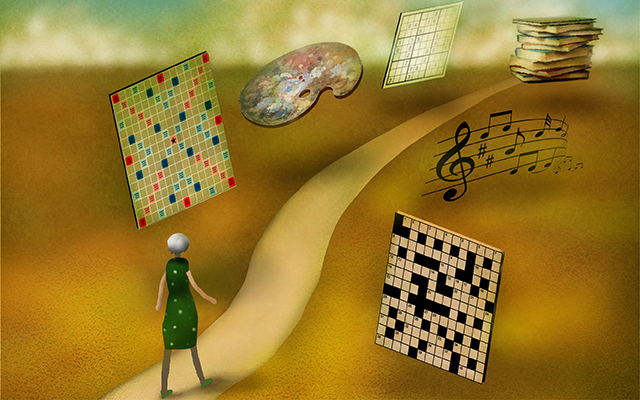Would you want to know whether you’re likely to descend into dementia sometime in the future? Michael Racke, MD, and his colleagues at Quest Diagnostics are betting that you — and millions of other Americans — would pay good money to find out. Because . . . well, knowledge is power, right?
The company has trotted out a simple blood test that measures a biomarker typically associated with Alzheimer’s. Curious older adults who believe they may be genetically predisposed to the disease — or just feel like they’re not as sharp as they used to be — can order the test, pop into one of Quest’s clinics, roll up their sleeve, and return home hoping for the best. The cost: $399 plus a $13 physician’s fee.
Quest debuted its AD-Detect Test for Alzheimer’s Disease Risk less than a month after the Food and Drug Administration (FDA) upgraded its approval of the controversial Alzheimer’s drug lecanemab. The agency’s decision made this type of pharmaceutical, designed to delay the progression of the disease in patients with mild cognitive impairment, available for the first time to patients outside of clinical trials. Medicare soon agreed to cover the $26,000 annual cost.
As Rita Rubin reports in JAMA, the timing of Quest’s marketing move met with some criticism among physicians and medical ethicists. New York University bioethicist Arthur Caplan, PhD, admitted that it made him “very nervous” because it hinted that treatment options are widely available. S. Ahmad Sajjadi, MD, PhD, chief of the Memory Disorders Division at the University of California at Irvine, agreed, calling the announcement “curious.”
“Unfortunately, the public is not aware of the exact criteria for eligibility for novel treatments,” Sajjadi tells Rubin. “And, often, I have encountered family members of my symptomatic patients who are under the impression that lecanemab can be an option for them given their family history.”
In fact, doctors have proven to be generally skeptical of lecanemab’s benefits and wary of its tendency to cause brain swelling. And patients must satisfy fairly narrow criteria to even become eligible for the treatment. Still, the availability of the drug, to Racke’s way of thinking, made the timing of Quest’s announcement a no-brainer. “I think if we had our druthers, we might have tried to be even earlier,” he says. But, he adds, “A year ago, nobody would have cared.”
That’s because there was no “breakthrough” drug available for Alzheimer’s sufferers at the time. And, by selling its test directly to consumers for the first time, Quest marketers had good reason to believe that demand would rise. Doctors, after all, presented a major obstacle to sales. As Sajjadi notes, few of his colleagues would lean on the results of a simple blood draw when making a diagnosis. “In our field,” he explains, “we have clear definitions and working criteria for defining the symptomatic stage of Alzheimer’s, which can only be determined by experts after careful history-taking and appropriate ancillary tests.”
It’s likely this more measured approach to a diagnosis would’ve relieved Wendy Nelson of some of her angst ignited by the results produced by a genetic test. After watching her mother die of Alzheimer’s in 2020, the 52-year-old biotech executive ordered 23andMe DNA test kits for herself and her three adult daughters. Nelson showed no signs of cognitive impairment and hoped the test results would provide some reassurance.
“It totally backfired,” she tells Reuters.
The DNA results showed that Nelson has two copies of the APOE4 gene, indicating a high risk of Alzheimer’s — eight to 10 times higher than people with the most common form of the gene. Her three daughters learned they each carried one copy of the gene, tripling or quadrupling their chances of developing the disease. Even before the results were revealed, Nelson was talking about assisted suicide as a viable alternative to enduring what her mother had experienced. The effect on her kids was predictable: “I would yell at her, cover my ears and run away,” her daughter Lindsey, 22, recalls. “There are many complicated emotions involved.”
And there are few resources available to help you navigate them. Even as Americans flock to APOE4 testing — a 125 percent increase between September 2022 and January 2023 — and other DNA inquiries, there’s little indication that our healthcare system is prepared to offer the kind of counseling help many need when confronted with the results. In the United States, there is one trained genetic counselor for every 82,000 people, according to a 2018 report in the European Journal of Human Genetics.
“We need a scalable way to warn people about the potential benefits and risks of genetic disclosure,” says Eric Reiman, MD, director of the Banner Alzheimer’s Institute, where researchers are developing an interactive online platform that can deliver APOE results — and subsequent counseling — to consumers who may not be prepared for bad news.
Nelson, whose genetic profile makes her more susceptible to the brain swelling that sometimes accompanies a lecanemab regimen, is banking on an experimental drug designed for people carrying two copies of APOE4. Meanwhile, she’s embarking on a list of adventures, admitting that if treatment provides no escape from dementia’s throes, she’ll eventually travel to a Swiss clinic offering legal euthanasia. “I do not want to live the way my mom had to live her last five years of life,” she says. “She was miserable.”
It’s an understandable response to the prospect of developing a devastating illness. And if at some point researchers produce a treatment that will rescue Nelson and millions of others from what they believe to be their sad destiny, then the knowledge they’ve gained from these tests may prove to be powerful. They may be equipped with the information they need to effectively survey their options well before the disease robs them of their agency.
While we wait for the next “breakthrough,” though, I prefer to remain in the dark. Knowledge may be power, but the future is unknowable — and sometimes ignorance is bliss.




